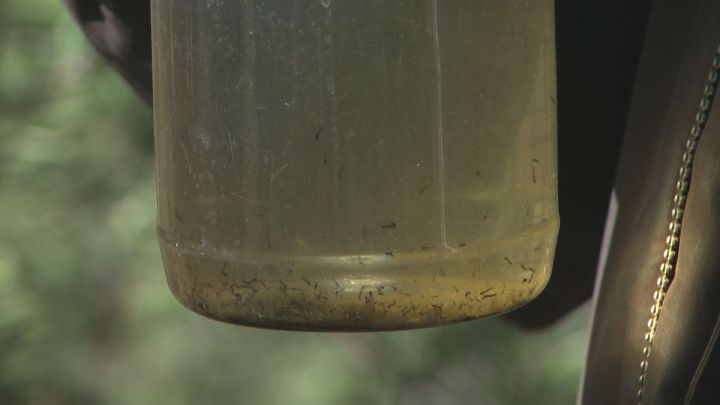EDMONTON- As it does every year, the city has once again declared war on Edmonton’s least popular summer visitors: mosquitoes.

By helicopter, by truck and by foot, crews began treating standing water within the city’s 1,400 square kilometre-mosquito control boundary on Wednesday.
READ MORE: Edmonton’s mosquito numbers soar
The insect-control effort is based largely on reducing the mosquito population before they emerge as adults. The highest concentrations of mosquito larvae are found in in standing water like in roadside ditches.
“Our most successful method for reducing pest populations is to attack the immature stages of the pest’s life cycle when they are most vulnerable,” Mike Jenkins, biological sciences technician with the City of Edmonton, said in a news release. “Experience has shown that controlling larvae is more effective because it reduces the number of mosquitoes that actually hatch into adults.”
The city says all products used in its mosquito control program are approved by Health Canada and considered safe for their intended use. Staff are certified by Alberta Environment and must meet the standards set out to apply mosquito control products.
“Edmonton is privileged to be one of only a few municipalities in Canada that funds a mosquito control program,” Ron Gabruck, director of Animal Care and Pest Management, said in a news release. “A lot of work and expertise goes into our program each season.”
- N.S. mom calls for better ultrasound access after private clinic reveals twins
- 3 women diagnosed with HIV after ‘vampire facials’ at unlicensed U.S. spa
- ‘Super lice’ are becoming more resistant to chemical shampoos. What to use instead
- Solar eclipse eye damage: More than 160 cases reported in Ontario, Quebec
“Overall, it looks like the season could be pretty dry and we’re not expecting much in the way of mosquito development at this point but it being Alberta, that can change at a moment’s notice,” Jenkins told reporters on Thursday. “If we get significant precipitation in the form of either rain or snow, it could definitely quickly turn into additional hatching of mosquito larvae.”
When asked if Edmontonians should take any additional precautions because of the Zika virus which has hit South America hard, Jenkins suggested there is nothing to worry about, at least for now.
“It’s actually carried by the same mosquito that carries dengue fever and yellow fever so Edmontonians are at about the same risk for getting Zika virus as they are for those diseases which is to say pretty remote,” Jenkins said. “This particular outbreak has a few additional features to it that kind of warrant additional attention. One is that it seems to be possibly switching to other species, which means that there is an additional concern as to whether those might carrying the disease. But most of the other species they’re looking at right now are also species that we don’t have in Canada.”
READ MORE: Canadian scientists testing Zika to see if virus can infect native mosquitoes
For more information on the city’s bug battle and how you can protect yourself from mosquitoes, click here.




Comments